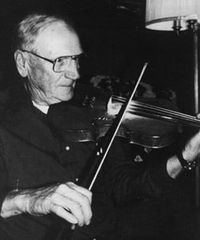Annotation:Little Whiskey: Difference between revisions
No edit summary |
No edit summary |
||
| Line 10: | Line 10: | ||
<div style="text-align: justify; direction: ltr; margin-bottom: 90px; margin-left: 70px; margin-right: 120px;"> | <div style="text-align: justify; direction: ltr; margin-bottom: 90px; margin-left: 70px; margin-right: 120px;"> | ||
<br> | <br> | ||
'''LITTLE WHISKEY.''' American, Reel (cut time). USA, Missouri. A Major ('A' part) & A Mixolydian ('B' part). Standard or AEae tuning (fiddle). AABB. The tune is known as a "tie-hacker" tune, one that was carried to the Mid-West by railroad workers. In the case of "Little Whiskey" the source was Nile Wilson [http://mofiddledance.org/profiles/nile-wilson/] (1912-2008) of Bucklin, Missouri, whose people were 'tie-hackers' from Illinois. Wilson learned "Little Whiskey" from his great-uncle Charlie Davis, but many members of his family played: | '''LITTLE WHISKEY.''' American, Reel (cut time). USA, Missouri. A Major ('A' part) & A Mixolydian ('B' part). Standard or AEae tuning (fiddle). AABB. The tune is known as a "tie-hacker" tune, one that was carried to the Mid-West by railroad workers. In the case of "Little Whiskey" the source was Nile Wilson [http://mofiddledance.org/profiles/nile-wilson/] (1912-2008) of Bucklin, Missouri, whose people formerly were 'tie-hackers' from Illinois. Wilson learned "Little Whiskey" from his great-uncle Charlie Davis, but many members of his family played: | ||
[[File:wilsonii.jpg|200px|thumb|left|Nile Wilson]] | [[File:wilsonii.jpg|200px|thumb|left|Nile Wilson]] | ||
<blockquote> | <blockquote> | ||
| Line 30: | Line 30: | ||
</font></p> | </font></p> | ||
<p><font face="Century Gothic" size="3"> | <p><font face="Century Gothic" size="3"> | ||
<font color=red>''Printed sources''</font> : - Phillips ('''Traditional American Fiddle Tunes, vol. | <font color=red>''Printed sources''</font> : - Phillips ('''Traditional American Fiddle Tunes, vol. 1'''), 1994; p. 144. | ||
<br> | <br> | ||
<br> | <br> | ||
Latest revision as of 21:09, 2 February 2020
X:1 T:Little Whiskey T:Little Whisky N:From the playing of Nile Wilson (1912-2008, Linn County, north-central Mo.) M:C| L:1/8 R:Reel Q:"Quick" N:"+" = pizz. note D:Grey Eagle 101, Nile Wilson - "Now that's a Good Tune" (1989) D:https://www.slippery-hill.com/recording/little-whisky-0 Z:Transcribed by Andrew Kuntz K:Amix +slide+e4- ef-ed|cABA cA3|[A,2E2]"+"e2[A,2E2]"+"e2|cABA cA3| |[A,2E2]"+"e2[A,2E2]"+"e2|cABA cA3|ef-gf e2d2|cABA cA3:| |:[Ae][Af][Ag][Aa] [A2g2][A2g2]|[Ae][Af][Af][Ag] [A4f4]|(f2 b2) (b2e)f|gfed cA3:|
LITTLE WHISKEY. American, Reel (cut time). USA, Missouri. A Major ('A' part) & A Mixolydian ('B' part). Standard or AEae tuning (fiddle). AABB. The tune is known as a "tie-hacker" tune, one that was carried to the Mid-West by railroad workers. In the case of "Little Whiskey" the source was Nile Wilson [1] (1912-2008) of Bucklin, Missouri, whose people formerly were 'tie-hackers' from Illinois. Wilson learned "Little Whiskey" from his great-uncle Charlie Davis, but many members of his family played:

He acquired his interest in the violin and much of his repertoire from his fiddling grandfathers, Isaac Roby Wilson and Tom Davis, and from his father, William Randolph "Dolph" Wilson. As a child, Nile was surrounded by traditional violin players, from his brother Orley and his uncle Lester Wilson to his great uncle Charlie Davis and numerous neighbors and friends. His grandfather Davis sang songs while he played fiddle tunes. ... [Liner notes to "Now That's a Good Tune"].
